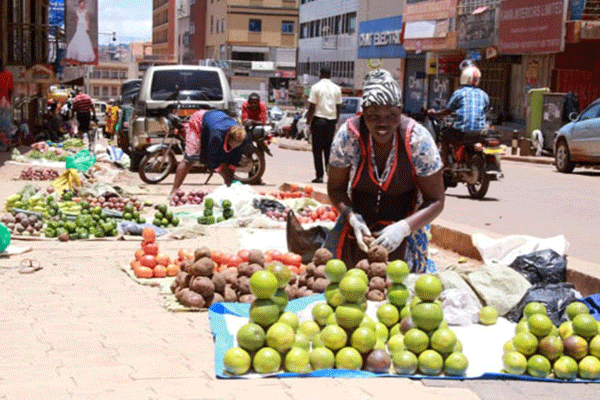Prime
Why KCCA is stuck with street vendors

Vendors have kept coming back on the city streets despite efforts to relocate them. PHOTO/FILE
What you need to know:
- Vendors argue that they cannot return to city markets when problems associated with the facilities have not yet been addressed.
Vendors have refused to vacate Kampala streets despite persistent warnings from city authorities.
Although there have been attempts to evict them, the vendors find ways of returning, especially during the electioneering period and festive season.
Kampala Capital City Authority (KCCA) banned street vending in 2015 in a bid to decongest the city and restore trade order, and subsequently acquired Usafi market in Kalitunsi-Mengo to resettle the evicted vendors.
However, vendors later abandoned the facility due to ‘unfavourable conditions’ and returned to the streets.
Efforts by KCCA to evict them from the streets have hit a snag, triggering protests from traders who argue that their presence blocks customers from accessing their shops.
The chairperson of Kampala Arcade Traders Association (Kata), Mr Godfrey Katongole, accused KCCA of failing to rein in street vendors whom he said are a big obstacle to restoring ortrade order.
“This problem has been ongoing for many years, and we have engaged KCCA several times about this matter in vain. It hurts for a street vendor to sell their merchandise in front of a trader who pays taxes to KCCA. There is a lot of confusion in the city because of street vendors. Traders will have no option but to pour their merchandise on streets too if authorities don’t get a long-term solution to this problem,” he said.
Kampala Lord Mayor Erias Lukwago told Daily Monitor yesterday that trade order in the city will always be a nightmare until government allocates to KCCA sufficient funds to construct markets and other common user facilities for the urban poor.
“In the meantime, we are processing a Bill for an ordinance to licence them and allow them operate in some streets in organised manner,” he said.
Following the November bomb blasts in the city, Kampala Resident City Commissioner (RCC), Mr Hussein Hudu, ordered all vendors to vacate the streets as a measure to decongest the city.
Mr Hudu said the vendors would be a target for the bombers since the latter target crowded places.
However, a month later, Mr Hudu rescinded and gave vendors a grace period of trading on streets until January 10 next year.
He advised all the vendors to find working spaces in the surrounding public markets to avoid being arrested.
“All vendors operating from the streets should find working spaces in the available public markets by January 10 next year. The city needs an upgrade,” he said.
However, the vendors accused the RCC of giving orders without first solving the problems associated with city markets.
“Usafi and Wandegeya markets have their own issues and KCCA is aware of them. We have been to those markets before but the conditions forced us out because there are no customers. For instance, Wandegeya market was poorly designed and that is why it is hard for vendors to sell their merchandise since there are no customers,” Mr Justus Birungi, the chairperson of Kampala United Vendors Association, said.
He advised government to build better facilities that are favourable for both vendors and customers.
Last week, KCCA’s acting spokesperson Juliet Bukirwa said they have embarked on sensitisation about trade order.
She said street vendors would be engaged on seeking working spaces in the available city public markets.
Ms Bukirwa, however, could not specify the number of available spaces that can accommodate the street vendors if evicted.
“We are currently sensitising the street vendors about the dangers of operating on streets. But there are also spaces in our public markets in the city which they could utilise,” she said.
But Ms Bukirwa didn’t explain why the previous attempts to relocate the vendors to the public markets failed.
In 2017, KCCA council gazetted some roads to be used by street vendors during evening hours. However, the technical wing declined to implement the resolution on grounds that it would worsen the situation.





